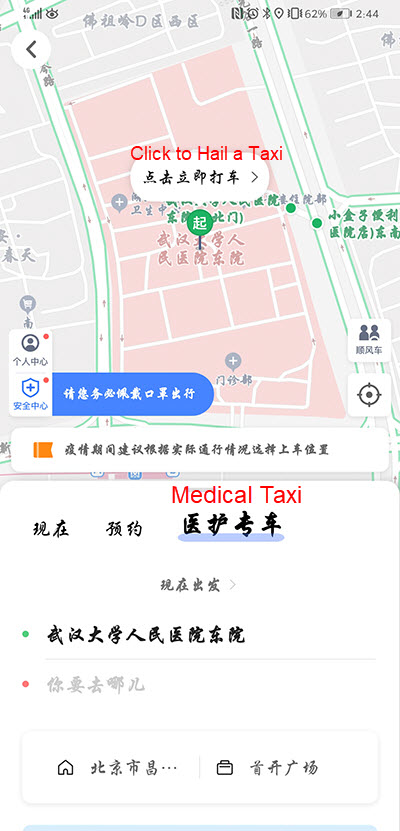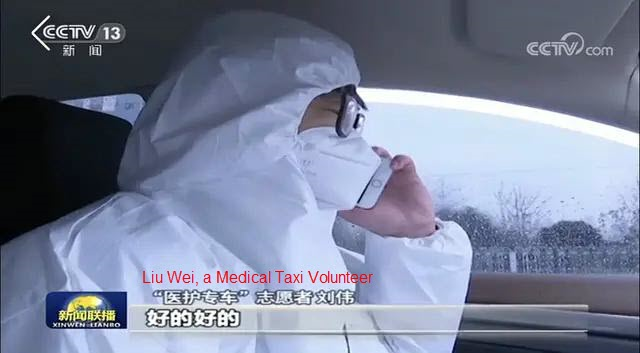In order to win this inevitable battle and fight against COVID-19, we must work together and share our experiences around the world. Join us in the fight against the outbreak through the Global MediXchange for Combating COVID-19 (GMCC) program. Apply now at https://covid-19.alibabacloud.com/
By Amap Tech.
With the outbreak of the coronavirus in China, thousands of doctors left their families to go fight on the frontlines of the disease in Wuhan. However, besides the great looming danger of the lethal disease, doctors and nurses also had a difficult time of commuting once in Wuhan, with all public transportation having ceased and little to no taxis providing services in the city.
AMAP, the mobile map and navigation hub of Alibaba, was deeply moved by this information, and their team of engineers and other professionals felt a strong call to action to help these medical heroes get to work.
Originally, medical workers that came to combat the virus in Wuhan had to depend on community service vehicles driven by a network of volunteers. However, these community service vehicles weren't 100% efficient and made the daily commute far from convenient. In fact, many frontline medical personnel found the system to be completely inadequate, feeling that they had no choice but to walk or bike to the hospital. All of this made serving at the frontlines of the coronavirus outbreak in Wuhan that much more difficult.
Solving transportation and congestion problems has always been AMAP's mission. So during this challenging time, the AMAP team felt especially compelled to resolve the commuting problems that China's medical heroes were facing.
In response to this awful situation, the AMAP team joined up with a local partner to develop a dedicated tool to provide free taxis to medical staff. At the same time, they also launched a volunteer driver recruitment campaign, providing people with the opportunity to do their part in combatting the epidemic in Wuhan by getting medical staff to work.

Screenshot of AMAP's Medical Taxi function
For medical staff to use the new function, all they needed to do was open the AMAP app (known as Gaode maps in Chinese) navigate to the "Taxi" page in the app and then find the all-new "Medical Taxi" option. After completing a basic identity authentication process, the doctor or nurse could call a medical taxi to their location. The service was, of course, free of charge.
On January 27, the AMAP team started discussions on the feasibility of such a project and started preparing the necessary resources. Since this project required a great deal of external support and preparatory work as well as the recruitment of several volunteers, plus cooperation with other operators, and purchasing of protective materials, it was a big undertaking. In particular, it was one where the technical, product, testing, and business teams all had to work together and do so quickly to make a difference.
By January 28, AMAP officially established the project. By that time, a special development team with 10 or so members was established. The team drew from AMAP's technical, server, and client teams. Everyone was excited to join the team, knowing that they could be a part of something that would make a difference in the lives of the medical personnel fighting the good war in Wuhan.
Server-related development for the Medical Taxi project was led by Zongben, a senior expert in this division. His team was responsible for such functions as real-time orders and reservations, SMS reminders and push notifications, tips, as well as risk control and whitelisting, among several other things.
Client-related development was led by Heyi, an wireless development expert. His team was responsible for the page portal and user interface, as well as such things as capacity display and merging, user-friendly tips, order adaptation, pop-up reminders, and other frontend development work.
It took only 72 hours, from the inception of the project to the launch of the initial version on February 1. It was an astonishing achievement, especially considering the fact that, normally, this type of function would take more than a week to develop.
"After the plan and launch time were slowly made real, the R&D team immediately split up the project and allocated specific tasks to be completed. Due to the tight schedule and difficult work, the QA team also needed sufficient time to test the function. Therefore, the frontend and backend development teams had to ensure that all joint debugging and self-testing could be completed by the morning of January 31", recalled one of the project engineers. In other words, the R&D team had only one night and one morning to complete their work—again, an astonishingly short window of time.
AMAP engineers are no strangers to tight schedules and heavy workloads. But this was even tighter than usual. Yet all the relevant personnel all took it in strides, well aware of the gravity of pushing out the Medical Taxi function. To do it, they had to work day and night. The server and client development teams were finished with their work about 4:00 the next day, and server-client joint debugging was carried out just after 7:00. All speed ensured they would be able to launch the function by February 1 as scheduled.
For similar emergency projects, the R&D team usually performs closed development in a conference room to ensure efficient communication and quickly complete development, joint debugging, testing, and launching. This time, however, because of the coronavirus outbreak, they had no choice to complete this project remotely, with each person in the time working from home.
"At the beginning, I felt that our communication efficiency and collaboration were nowhere near to that of face-to-face work. However, because we agreed to synchronize requirements and progress through DingTalk and Alilang video conferencing calls at fixed times in day, our efficiency was actually quite high. Through a tight schedule, we were able to overcome many obstacles, with everyone going above and beyond to finish in time. And, in the end, we were able to coordinate resources to solve all the problems. Handling and resolving all the technical problems only took a matter of hours."
Normally, R&D engineers would be quick to complain about frequent changes to project requirements. This time, however, whenever they were faced with a change, they simply answered OK. "We all knew the importance of our work. Our team was very enthusiastic because we were doing something to combat the epidemic and protect lives in Wuhan."
After the Medical taxis service was launched, the team quickly received positive and encouraging feedback from medical personnel. The medical personnel also proposed some changes, including a reservation function. With this kind of feedback, the R&D team immediately went to work on solutions. Following the same principles of a quick launch, consistent quality, and complete functionality, they were able to launch the reservation function the very next day.
AMAP was able to quickly launch this project due to the skills and capabilities they developed in their routine work. Over the past year, AMAP optimized their servers for real-time orders, reservations, as well as airport pick-ups and drop-offs. This allowed us to quickly develop a Medical Taxi service on short notice. Similarly, last year, AMAP upgraded its client architecture to allow for the unified development for multiple terminals. This time, the overall R&D efficiency was effectively improved due to the upgrade of the frontend framework. For medical taxi service, the benefits were particularly significant.
"I learned a lot about our team in the three days we worked together."
There was a development engineer named Guibao who went to the supermarket with his wife at around 15:00 on January 30. On their way back, he saw five missed calls on his mobile phone. When he contacted his coworkers, he learned that there was an emergency project to provide taxis for medical workers in the epidemic area. On his way home, Guibao held a conference call with the team to discuss terminal implementation and possible difficulties. When he got home, he turned on his computer and started on the project. He completed the order addition, capacity check, and order interface adaptation functions for the frontend tab before midnight that same day.
On January 31, it was confirmed that the text under the Medical Taxi tab should say "Free". According to the selected Medical Taxi tab record, the client displays the text "Free" for the capacity, home and company display, and estimated price of 101 status orders. After a phone call was made to confirm the plan, the frontend development was completed around midnight.
On February 1, the QA personnel tested the function. After quickly testing and fixing bugs, they successfully launched the project at 15:00. Everyone came together to make this early launch possible. When Yulong, a member of the R&D team, called to say that the function was up and running, no one had even eaten lunch yet.
Later, the function was well received, and the medical staff in the WeChat group were particularly excited to see that they could use AMAP to hail dedicated medical taxis. Due to the high demand for a reservation function, the project team discussed how they could add support for such a function.
That night, Guibao had put his mobile phone on mute. So it wasn't until late that night that he saw the news on DingTalk. Although he was getting ready to go to bed, he called Yulong and learned that the team wanted to launch a reservation function by the afternoon of February 2. After confirming the need assessment on DingTalk, he contacted Fushi, an R&D coworker on the project team, to confirm that the service interface would go through joint debugging on the morning of February 2.
After confirming the joint debugging time, he agreed to get up at 6:00 to start the development work. However, Guibao felt uneasy. Therefore, he started early in the morning and finished development and self-testing in just over three hours. After he confirmed the completion of the task, it was already almost 4:00. Few hours later, he woke up to his daughter: "Dad, Dad, wake up".
On the morning of February 2, the team performed joint debugging, tested, and fixed bugs in the code. At about 15:00, the medical taxi reservation function began a phased launch in Wuhan.
The parents of the R&D engineer Yuanwei did not know much about the Internet, but they watched the news on TV every day. They saw Alibaba donate money to the epidemic area and then asked Yuanwei what he was doing working overtime. He said he was providing free taxi services to medical staff in Wuhan. Full of pride, his mother said, "Your company is doing great things!" Then, they turned off the TV so they would not interrupt his important work. After Yuanwei worked for a whole day without eating, his mother prepared some warm milk and sat silently by his side late into the night.
In fact, there have been a lot of similar stories over the past three days.
From 2 to 5 of February, four versions of the Medical Taxi function were released, almost one per day. Engineers from the product, server R&D, frontend R&D, QA, and shared mobility teams were all racing against the clock to help fight the epidemic in Wuhan.
The engineers told me that when they saw medical staff in Wuhan use the AMAP app to hail medical taxis on CCTV, they were overwhelmed by pride that they were able to make a contribution.

CCTV report on the Medical Taxi Service
This work would not have been possible without the support of the engineers' family members. One of the engineers said, "I really should thank my wife for her support of my work. She heated up food for me, took care of our daughter, and did not let my daughter disturb me from my work. I also need to thank my three and a half year-old daughter, who is a great kid."
The engineers also paid tribute to the medical staff who fought on the frontline and the drivers of the medical taxis. Just like everyone else, we all need to do our part to overcome this epidemic.
While continuing to wage war against the worldwide outbreak, Alibaba Cloud will play its part and will do all it can to help others in their battles with the coronavirus. Learn how we can support your business continuity at https://www.alibabacloud.com/campaign/supports-your-business-anytime
See How Alibaba Cloud Powered Some of China's Best Classrooms in the Cloud

2,593 posts | 776 followers
FollowAlibaba Clouder - April 29, 2020
Alibaba Clouder - April 3, 2020
Alibaba Clouder - April 2, 2020
Alibaba Clouder - March 20, 2020
Alibaba Clouder - April 3, 2020
Alibaba Clouder - April 3, 2020

2,593 posts | 776 followers
Follow DingTalk Solution
DingTalk Solution
Alibaba's DingTalk is significantly helping us all to mitigate the medical, educational, and economic risks of the unforeseen COVID-19 outbreak.
Learn More Mobile Testing
Mobile Testing
Provides comprehensive quality assurance for the release of your apps.
Learn More Dedicated DingTalk Solution
Dedicated DingTalk Solution
Organizations of any size can leverage DingTalk’s enterprise-exclusive APIs to quickly create customized mobile workspaces on DingTalk or mobile applications while taking full control of your business data.
Learn More Fight Coronavirus [COVID-19]
Fight Coronavirus [COVID-19]
Empowering businesses to fight against coronavirus through technology
Learn MoreMore Posts by Alibaba Clouder